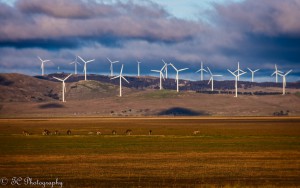Treasurer Joe Hockey loathes them, the coal industry doesn’t like them much either, but the latest high level investigation into the whether wind farms create negative health impacts for those living nearby has drawn a conspicuous blank on the scientific evidence front from the National Health and Medical Research Council (NHMRC).
In a statement accompanying the NHMRC’s Information Paper: Evidence on Wind Farms and Human Health, released on Wednesday, found no consistent evidence that exposure to wind farm noise affects human physical or mental health, the peak research body “found no consistent evidence that exposure to wind farm noise affects human physical or mental health.”
The official finding is a setback for anti-wind farm activists who have been championing assertions that so called ‘low level noise’ creates negative health impacts for people living nearby the giant structures.
Acrimonious debate around what some opponents to wind farms have dubbed ‘wind turbine syndrome’ and supporters of the clean energy movement has been bubbling away for at least three years, with Prime Minister Tony Abbott taking a personal interest in the matter.
However the government commissioned report found that just 13 of 4,000 studies internationally have looked at the possible relationships between wind farm emissions and health outcomes. Of that 13, just a single study was conducted in Australia “showing a clear lack of research based around Australia’s unique environmental conditions,” the NHMRC said.
However the peak research body did note that wind farms can annoy people.
“There is some evidence that wind farm noise is associated with annoyance and parallel evidence suggests that prolonged annoyance due to noise may result in stress, which can have adverse effects on human health.”
Federal Industry (and now Science) Minister Ian MacFarlane said that the government recognised that “some members of the community are concerned about the development of wind farms.”
“Just as we promised prior to the election, we are listening to Australians worried about potential health effects caused by wind farms and we are working to resolve these concerns, including by independent analysis.”
Despite the lack of evidence found by the NHMRC, the body has allocated another half a million dollars in grants to a “Targeted Call for Research on Wind Farms and Human Health.”
The NHMRC said the grants would be “dependent on submitted research proposals being assessed as high-quality by rigorous, independent peer review.”
Mr MacFarlane said the Government will now examine the NHMRC report and “will be reviewing the results of the targeted research to consider how noise from wind farms may affect human health, so that any approach to measuring noise can be targeted appropriately.”






It’s very hard to see how low level noise from wind turbines would be any worse than the noise from living near, or even not so near, a relatively busy road.
Can anyone advise how the noise, and its effects, wouild be different?
Now in my 9th year of living within 2ks of Wind Farm, retired and home most of the time with doors and windows open, I have suffered no ill-effects or annoyance nor has my small and aged dog, and the cattle up on the hill opposite virtually beneath appear to notice nothing unusual. I take my visitors up to stand very close to them and they are all captivated by the gentle swish and the graceful turning of the turbines. As there were never any inquiries into the safety of electricity plants producing power and gas from coal, this further inquiry appears to be the result of pressure from mining companies whose profit margin is threatened by renewable power. Meanwhile the residents of Morwell not only suffer constant pollution from the nearby power station but many will never recover from the effects of last years disastrous fire for which the State Government was ill-prepared. So why are major party politicians so willing to be the tools of the purveyors of 19thC coal power to the obvious detriment of our land, water and atmosphere? They will be judged very severely in the future when it’s too late to redress the damage they continue to inflict and their descendents will share the pain with mine.